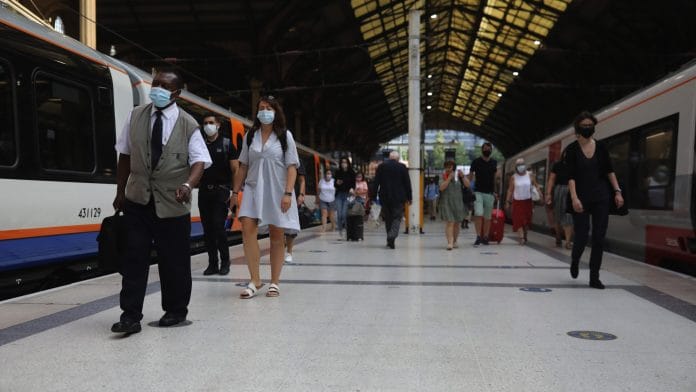London: Around 3.4 million people in England — 6% of the population — have contracted coronavirus, with infection rates twice as high in London, a major antibody study found.
A mass survey of more than 100,000 people — which the government says is the biggest of its kind in the world — suggested the extent of the outbreak varied widely between different areas and population groups.
In London, 13% of people had antibodies while in the South West of England it was less than 3%, according to the research, released by the Department of Health and Imperial College London. People from Black, Asian and other minority ethnic groups, care workers, and people living in larger households were among the most likely to have been infected.
The research involved 100,000 people testing themselves at home for coronavirus antibodies between June 20 and July 13. The government said there is no firm evidence that antibodies provide immunity.
But the findings are significant because they are likely to influence the decisions officials will make about what kind of lockdown restrictions are needed in the future, and which groups are at greatest risk. Boris Johnson’s government has been attacked for its handling of the pandemic, which left the U.K. with the highest death toll in Europe and facing the deepest recession of any comparable country.
Heavy burden
There was no breakthrough on the quest for a home antibody test for general use among the public. Separate studies, also unveiled on Thursday, evaluated a range of finger-prick home antibody tests but found the results were not reliable enough to be given government approval for widespread use, officials said. The tests were still deemed to be suitable for surveillance studies such as the Imperial research.
The burden of Covid-19 “has fallen particularly heavily on ethnic minority groups and key workers, particularly in care homes and healthcare,” said Professor Helen Ward, one of the researchers involved. “Those in deprived and densely populated areas are most likely to have been exposed to the virus, and we need to do far more to protect people from any future waves of infection.”
The findings included:
- Among the most likely to have been infected were care home workers (16%) and health care staff (12%).
- In the wider population, 17% of people from Black backgrounds and 12% of people from Asian groups were infected.
- People in the most deprived areas of England had higher antibody levels than those in the wealthiest areas.
- The study suggested one in three people with antibodies showed no symptoms, a feature that increased among the over-65s.
This surveillance study will be repeated in autumn and will test a further 200,000 people for antibodies. The government urged more people to sign up.
“Large scale antibody surveillance studies are crucial to helping us understand how the virus has spread across the country and whether there are specific groups who are more vulnerable,” Health Minister Edward Argar said in an emailed statement. “We don’t yet know that antibodies provide immunity to coronavirus, but the more information we can gather on this virus, and the easier we can make it for people to participate in these studies, the better equipped we will be to respond.”- Bloomberg
Also read: Sweden’s strategy of controlled Covid spread fails in achieving herd immunity







So does this mean the reported numbers so far, of ~315K affected could just potentially be 10% of the actual 3.4M cases in UK?